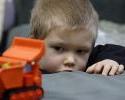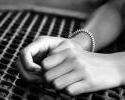Children, Pediatrics, and Neurobiological Disorders
In 1982, when I was in the second year of my pediatric residency, my two-year old daughter began having serious, unexplained behavior problems. She was at a well-respected Montessori preschool. Her teacher said, "I have taught many children over the years but I have never had a child like Monica. I have helped many children but I don't know how to help her. You will have to take her out of the school." This was to be the beginning of a personal and mostly self-taught education in childhood neurobiological disorders that is still continuing.
As a pediatric resident, a pediatrician-in-training, I knew very little about child psychiatry. I had several lectures in medical school about the subject, but I had no clinical experience. The childhood psychiatric disorders I had learned about included adjustment reactions, speech, reading and learning disabilities, bed wetting, nail biting, thumb sucking, hyperactivity, drug and alcohol dependency, and personality disorders.
I was taught that childhood psychoses were treated by psychotherapy and behavior modification to try to break the pathological pattern between the mother and the child. Medication was felt to alleviate the most prominent symptoms but did not affect the basic causes of the disorder which were felt to be psychological.
As a resident I learned about pediatric behavior and emotional disorders from clinical cases that were presented at "psychosocial rounds." These presentations were heavily biased toward presenting the case as a parental or dysfunctional family problem. Many of the pediatric residents tried to skip these seminars as they didn't see the relevance to the medical practice of pediatrics.
With this educational background you can understand why, like most parents, I felt bewildered and embarrassed when my daughter was referred for psychiatric evaluation at age three. I could not imagine what I had done to disturb her development so drastically.
Despite intensive psychological and psychosocial intervention, including individual and family therapy, therapeutic preschool and special education, my child became worse and more behaviorally disabled with age. As one of her teachers said, "She seems to be stuck at age two."
However, as I observed her disordered behavior, I became convinced that she had a biological disorder.
In 1987, when my daughter was seven, a good friend from my residency program, who is now a pediatric neurologist, suggested that she may be having manic episodes. This led to the diagnosis of childhood bipolar disorder, a rare diagnosis at that time.
When she was treated with lithium her behavior improved and stabilized. Without this diagnosis and medication she would have had to live in a psychiatric facility as her aggressive and unpredictable behavior would not have allowed her to live at home.
My residency training was similar to the training of many pediatricians now in practice. Is it any wonder that many pediatricians know little about childhood neurobiological disorders including major depression, bipolar disorder, schizophrenia, schizoaffective disorder, anxiety disorders, autism and pervasive developmental disorder, obsessive-compulsive disorder, attention deficit hyperactivity disorder and Tourette's?
The two medical journals read most frequently by pediatricians, Pediatrics and The Journal of Pediatrics, have had few articles about childhood psychiatric disorders.
This is reflected by work done in 1988 by Elizabeth Costello, Ph.D., from the Department of Psychiatry, Duke University. She found that general pediatricians in a large health maintenance organization identified only 17% of children with psychiatric disorders. Pediatricians missed 83% of children with DSM-III diagnoses! Predictably, pediatricians were more likely to recognize and diagnose bed wetting and learning problems than anxiety, depression or neurobiological disorders.
Some reasons why under diagnosis might occur are that pediatricians receive relatively little training in child psychopathology and may not identify psychiatric problems. Some pediatricians may not believe that provision of mental health services falls within their role as pediatricians. Pediatric practices are usually "high volume" leaving little time for psychosocial assessment. The pediatrician may not pay much attention to the parent's behavioral complaints about the child. Parents may not present pediatricians with concerns about their children's emotional and behavioral problems. The pediatrician may lack appropriate screening procedures. There may be a lack of pediatric mental health services in the community. Pediatricians may not want to attach labels to children.
That pediatricians are so uninformed about childhood neurobiological disorders is hard to justify as these disorders are brain malfunctions, medical disorders treated with medication and supportive care, and are not "emotional" or "psychosocial" problems.
An approach to improving identification psychiatric disorders by pediatricians is the use of checklists, structured questions to be asked by the pediatrician or completed by the parent.
One such questionnaire is the "Pediatric Symptom Checklist," a 35 item list of questions that focuses on the child's day-to-day life including friends, family, play, school and general mood. It was developed by Michael S. Jellinek, M.D., from Harvard Medical School. The questionnaire is designed to be completed in the pediatric waiting room by parents and only takes 3 to 5 minutes to complete. In a study population, sixty-eight percent of children identified by the Pediatric Symptom Checklist were truly impaired on other criteria. Ninety-five percent of children with psychiatric disorders were identified by the Pediatric Symptom Checklist.
A 13 item checklist for pediatricians has been developed by researchers at Yale using questions in the areas of physical growth and development, sleep, motor activity, cognitive and language ability, school, behavior, psychophysiological symptoms, feelings, thought, peer activity, parent-child interaction, social and family problems. While this checklist has been shown to increase the percentage of developmental and psychosocial problems recognized by pediatricians it is not specific for the neurobiological disorders.
While checklists and manuals are helpful, pediatricians are best able to identify and diagnose disorders when they are familiar with them. More information about the neurobiological disorders is needed by primary care pediatricians through articles in pediatric journals, seminars and continuing medical education courses. Pediatric residents need to be educated about the revolution in the neurosciences and need to be familiar with the signs, symptoms, diagnosis and appropriate treatment of neurobiological disorders. When the neurobiological disorders are recognized by pediatricians as serious, disabling, physical disorders of brain function the importance of early diagnosis and treatment will become clear and more children with disorders will be identified.
My daughter is now fifteen. Although she is seriously disabled by her bipolar disorder, the early identification and treatment of the disorder with medication has allowed her to remain at home and to have a much more normal childhood.
She played on a softball team for three years and was the star goalie on a soccer team. She has taken gymnastics, dancing lessons and horseback riding lessons. She has participated in her church youth group and has been to Girl Scout Camp.
None of these experiences would have been possible without diagnosis and medication.
Monica's wish is that "...people will understand my problem better and scientists will find better ways to diagnose and treat it." She was very fortunate to have her neurobiological disorder diagnosed so early. I want other kids to have that chance, too.
Source: Andrea Eberle, M.D., Ph.D. is a pediatric endocrinologist at the University of Tennessee Medical Center, Knoxville, Tennessee, a five-year member of Knox AMI and Chair of the Tennessee AMI Child and Adolescent Committee. Reprinted from NAMI's The JOURNAL, Volume 5, Number 4.






